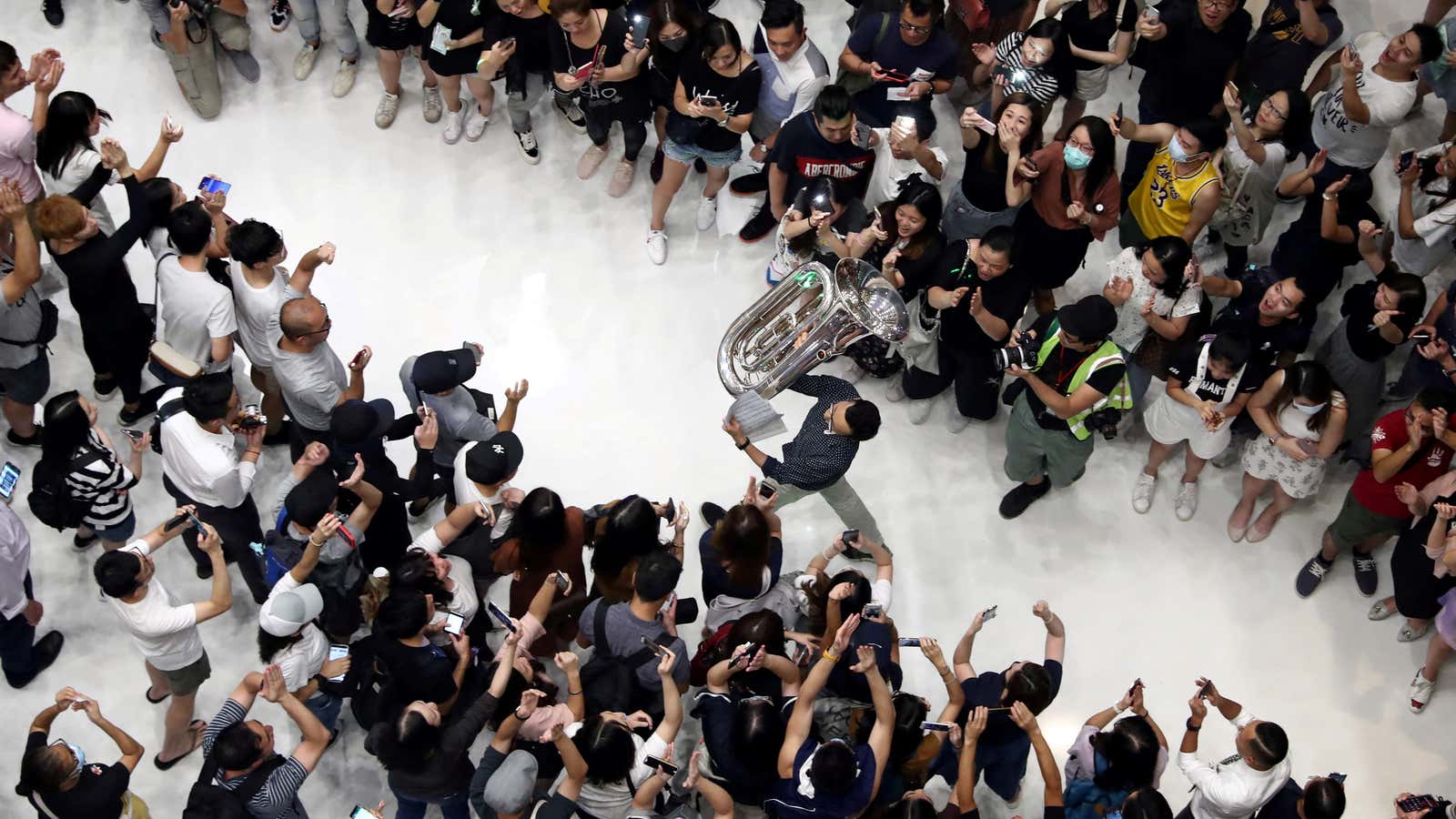Hong Kong’s protest movement is sending Beijing another message this week: When people identify with a song, you don’t need a law to make them sing and love it.
This week singalongs to a ballad the city has adopted as its own—Glory to Hong Kong—broke out at a football match between Hong Kong and Iran and at malls all over the city. In turn, pro-Beijing residents have begun responding by singing the Chinese national anthem, March of the Volunteers.
At lunchtime today (September 12), over 100 people waving Chinese flags turned up at the atrium of the IFC Mall, a high-end shopping complex in the city’s central business area, and sang March of the Volunteers. They were responding to an online post calling on people to form a patriotic singing flash mob to counter the sweeping popularity of the new song.
But the flash mob quickly turned into a singing showdown after the group was surrounded and outnumbered by those singing Glory to Hong Kong (願榮光歸香港) and chanting “Reclaim Hong Kong, Revolution of Our Times,” the slogan of this summer’s protests. Hong Kong has seen mass demonstrations since June, which were sparked initially by a controversial extradition bill that heightened fears the city was losing its autonomy from mainland China. The bill, which would have allowed suspects to be sent to the mainland to face trial, was suspended in mid-June, and withdrawn earlier this month. But protests demands have broadened to calls for an inquiry into police brutality and for democratic elections.
The episode at the IFC mall was the first face-to-face showdown between the two anthems since the song honoring Hong Kong surfaced last month. Composed by a musician named Thomas who is in his 20s, Time reported, the song was mixed with the help of volunteers from the LIHKG forum, a sort of online headquarters for the protest movement, who recorded themselves singing it. Users of the forum also contributed some of the lyrics, for example by incorporating the “Reclaim Hong Kong” protest slogan into the song.
A YouTube music video of the song from two weeks ago has already accumulated more than 1.5 million views. Dozens of versions of the song have emerged, including a video of the song sung in English lyrics and another in Italian. Yesterday (September 11), a new video showing the song being performed by an orchestra of musicians dressed in protest gear, including gas masks, hard hats and black T-shirts, in a misty dark room as if surrounded by tear gas, was uploaded to YouTube.
Hong Kong had earlier this year introduced legislation to make it an offence to insult the national anthem, after similar legislation was passed in the mainland. Hong Kongers angry over Beijing’s failure to introduce universal voting in the city have booed the song, which many in the city don’t identify with, at games in recent years. But the extradition protests made it impossible for the government to move ahead on that legislation either.
This isn’t the only protest song Hong Kongers have belted out—Do You Hear the People Sing from the Broadway musical Les Misérables and the hymn Sing Hallelujah to the Lord have been heard often this summer. And previously some Hongkongers considered this song (paywall) by a legendary Hong Kong rock band to be the city’s unofficial anthem. But the new composition has hit a chord, with people singing it in public spots night after night. A political commentator has called on Hongkongers to gather on the night of the Mid-Autumn Festival tomorrow (Sept. 13) to sing together.
A few people tried to counter the power of Glory to Hong Kong Wednesday night but ended up singing the Chinese national anthem to an empty shopping mall.
Some have expressed their love for the song on LIHKG and Twitter by saying that they “finally understand why people cry when they sing their national anthems.” To that, the composer commented this week in an LIHKG thread (link in Chinese] that the song can only be a protest song: “There is no nation. How can there be a national anthem?”
